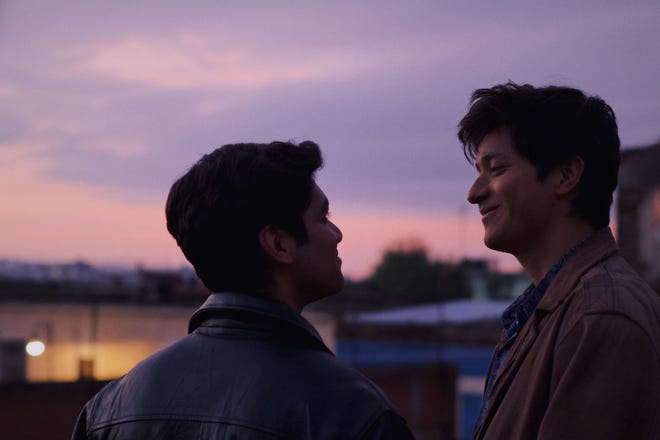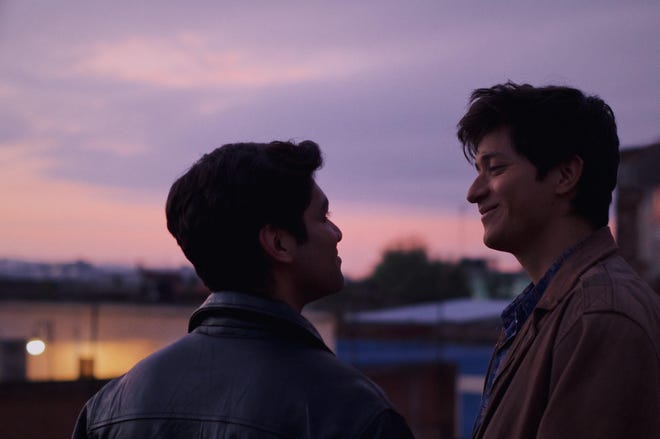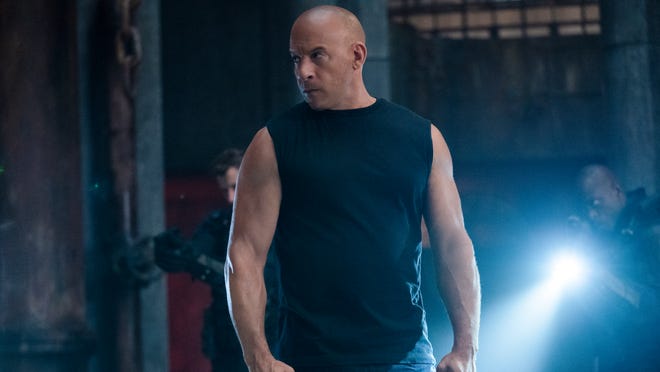It has all the makings of a classic Hollywood meet-cute.
Twenty-five years ago, Gerardo Zabaleta was at a small gay bar in Puebla, Mexico, when he spotted a cute guy across the room. Having just come from his teaching job, he took out his laser pointer and shined it on the handsome stranger.
“(My friend) was like, ‘Someone is pointing at you with that laser!’ And I was like, ‘No, that’s not for me,'” says Iván Garcia, Zabaleta’s now-partner. “Then I saw him and was like, ‘Oh, I really like this guy.’ So we started having a nice conversation and the rest is history.”
Their love story is now the subject of a heart-tugging new drama, “I Carry You With Me” (in theaters Friday), a hybrid documentary and narrative feature film. Set in the 1990s, the Spanish-language movie begins with younger versions of Iván and Gerardo (played by Armando Espitia and Christian Vázquez, respectively) as they meet and start dating in secret. Iván, who is closeted, is separated from his wife but still helps care for their young son. Gerardo, meanwhile, is openly gay and suffered horrific abuse and homophobia from his father and others growing up.
‘The Green Knight,’ ‘Zola’ and more:10 indie films you absolutely must watch this summer

“It’s still very difficult right now in Mexico to be a gay person, but 25 years ago with our families, we couldn’t express ourselves,” Zabaleta says. “We were hiding our relationship: ‘It’s my cousin. It’s my roommate. It’s my best friend.'”
When Iván’s family finds out about Gerardo midway through the film, he makes the difficult decision to migrate illegally to the U.S. to pursue his dream of becoming a chef in New York.
As a child, “I saw many movies with New York and it was like, ‘Everything is beautiful and amazing,'” Garcia says. “But when I came here, the reality was totally different: the language barrier, the people. I was leaving my family and living alone in a different city in a different country.”

“You don’t know anybody, you don’t have money, you don’t have a job. The last thing you have is hope,” adds Zabaleta, who tried for months to secure a visa before crossing the border. After Garcia left Mexico, “I was like, ‘Gerardo, what do you want to do? Follow the love of your life or stay here?’ It was very hard at times but I made the best decision.”
“I Carry You With Me” transitions to a documentary in its second half, following Garcia and Zabaleta in present-day New York, where they now run two Mexican restaurants. The decision was born out of necessity for filmmaker Heidi Ewing (“Jesus Camp”), a longtime friend of the couple who first learned the full story of how they came to the U.S. back in 2012.
“We began filming, and I realized at some point that I was filming the third act of a movie,” Ewing says. “Their epic love story and journey and childhood memories really deserved only what a narrative can offer and the documentary was not going to cut it.”
But Ewing considered pausing the project when Donald Trump was elected president in 2016, given that both Garcia and Zabaleta are not yet U.S. citizens. (According to a 2019 study by the Brookings Institution, there is estimated to be roughly 10.5 to 12 million people living in the U.S. illegally – about 3.2%-3.6% of the population.)
“ICE was deporting a lot of people that previously hadn’t been deported and there were a lot of rumors about roundups in New York and Brooklyn. It was a very scary time,” Ewing says. She offered to change her subjects’ names and occupations for the film, but “they said, ‘No, we’ve come all this way.’ They’re fearless. They’ve been here a long time, they employ a lot of people, they pay taxes, and they have hoped their (citizenship) status could change. I’m just in awe, because it’s not without risk.”

Now that “I Carry You With Me” is being released in theaters, Zabaleta admits “we are very nervous. But this is our life and it’s true and we are sharing that. When I hear somebody is struggling or suffering, I tell them, ‘Yes, that happens sometimes, but you can have a better life.’ It’s a good feeling, (sharing) this message for the undocumented people or the gay people that there is hope at the end of the tunnel. And we need to keep fighting for the gay community’s rights and for the immigrants.”
And ultimately, the film brought the couple closer to their families, who screened it in Mexico City.
“For many years we were hiding,” Garcia says. “Now my mom is like, ‘I love you. I’m so proud of you.’ They are very happy with the movie and all the things they saw, so now we can talk more openly. I’m so happy. I’m feeling more light.”









